The Future of the Eisteddfod
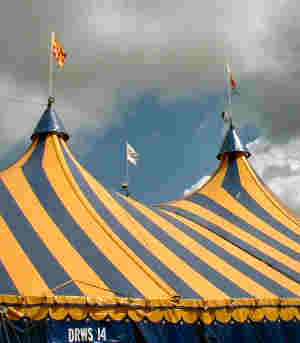
I kicked off with this issue last year, when it appeared grave enough, but, if anything things have got worse and even more complicated.
Last year's Eisteddfod lost money but this year's is expected to make a profit of about �100,000. Attendance was up at around 157,000 and there were more stands on the field than ever before, over 400! [1] While this is an improvement, it is very modest given the cutback in spending and vigorous attempts by the organisers to make the festival more attractive to a wider audience and increase both sponsorship and fundraising from the public. The extent to which the festival relies on Local Government Authorities for financial support became even more obvious this year when it came to deciding the location, in North Wales, for the 2007 festival. The Eisteddfod is understood to have favoured Flintshire, where it was held in 1969, the year of the investiture of the Prince of Wales. However, no council in North Wales could afford the financial commitement that was required to host the festival (around �300,000), and as of now [August 2005] the location of the 2007 festival is unresolved. Porthmadog Council offered earlier in the year but this offer seems to have gone to ground, presumably for lack of funding. This is a serious problem as there is normally a two year run up period during which the chosen location gears itself up to the requirements of the festival.
Even as things stand, and taking account of the contribution of the host local authority, the Eisteddfod needs an extra �188,000 a year to survive and this is after cutting �200,000 a year off its spending.
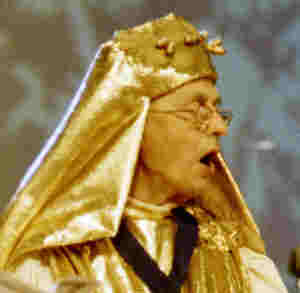 There is one offer to host the 2007 festival - from Liverpool. This has divided the festival organisers and the rest of Welsh-speaking Wales. The festival is a Welsh festival and operates through Welsh. Holding it outside Wales runs a number of risks: there may not be a sufficiently robust Welsh-speaking community in the location to sustain the festival; people may not travel to attend at a location outside Wales; the festival would be submerged in an English-speaking environment and would not fulfil one of its main aims - to raise consciousness of Welsh and leave a positive image and enthusiasm for the language in the chosen area. The former Archdruid, Robyn Lewis, fears that the scouses would ridicule the Gorsedd and all its pomps and others still retain a sense of resentment against Liverpool over the flooding of the Tryweryn valley in 1957, where a living Welsh-speaking community was expelled to make way for a reservoir to supply water to Liverpool. This has been immortalised in Dafydd Iwan's protest song, "Wyti'n cofio" which lists the suffering of the Welsh over the three decades up to the election of Gwynfor Evans [in 1966] - "nos y gwawrio" - what was then perceived as the dawn of a new age for Welsh-speaking communities.
There is one offer to host the 2007 festival - from Liverpool. This has divided the festival organisers and the rest of Welsh-speaking Wales. The festival is a Welsh festival and operates through Welsh. Holding it outside Wales runs a number of risks: there may not be a sufficiently robust Welsh-speaking community in the location to sustain the festival; people may not travel to attend at a location outside Wales; the festival would be submerged in an English-speaking environment and would not fulfil one of its main aims - to raise consciousness of Welsh and leave a positive image and enthusiasm for the language in the chosen area. The former Archdruid, Robyn Lewis, fears that the scouses would ridicule the Gorsedd and all its pomps and others still retain a sense of resentment against Liverpool over the flooding of the Tryweryn valley in 1957, where a living Welsh-speaking community was expelled to make way for a reservoir to supply water to Liverpool. This has been immortalised in Dafydd Iwan's protest song, "Wyti'n cofio" which lists the suffering of the Welsh over the three decades up to the election of Gwynfor Evans [in 1966] - "nos y gwawrio" - what was then perceived as the dawn of a new age for Welsh-speaking communities.A number of alternatives to accepting the Liverpool offer were considered:
- bring forward the Cardiff Eisteddfod due in 2008 (This would upset the north/south alternating pattern and would still be only be a temporary solution)
- use the existing International Eisteddfod pavillion at Llangollen (This could lead to even greater confusion than at present between the two festivals and preparations on the same site would overlap. The National is the first full week in August while the International is in mid July.)
- use the Royal Welsh showground in Builth Wells (Both this and the Llangollen option involve a fixed site which would undermine the many positive effects of a travelling Eisteddfod.)
- hold a TV Eisteddfod as the Urdd did during the Foot & Mouth outbreak and as Mountain Ash did (radio) in 1940 during the WWII. (This would break the continuity and undermine the atmosphere of the Eisteddfod. It is all very well for a specific emergency but the festival is facing a systemic or structural problem that needs to be addressed.)
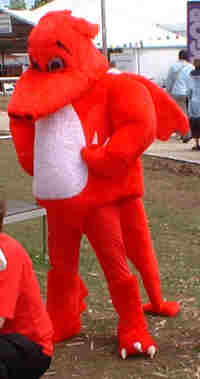 There is one possible answer being mooted to the financial problem of the host Local Authority. If all Local Authorities shared the burden by paying into a central fund, irrespective of the location of the festival, it could continue as before to alternate between North and South Wales, and the host Local Authority could concentrate on its contribution in kind rather than having to bear a disproportionate share of the financing.
There is one possible answer being mooted to the financial problem of the host Local Authority. If all Local Authorities shared the burden by paying into a central fund, irrespective of the location of the festival, it could continue as before to alternate between North and South Wales, and the host Local Authority could concentrate on its contribution in kind rather than having to bear a disproportionate share of the financing. The proposal, which seems the only permanent solution for a travelling Eisteddfod, is encountering opposition among Local Authorities who have other, often more pressing demands on their limited resources. Also, many Local Authorities in non-Welsh-speaking areas may feel the Eisteddfod is not doing enough to cater for non-Welsh speakers, despite the festival's valliant efforts to do so, short of compromising the nature of the festival itself.
Former Plaid Cymru president, Dafydd Wigley, has taken the view that the festival should be held in Wales, but if that does not prove possible, Liverpool's offer should be accepted as skipping a year could be the beginning of the end for the festival: vital staff might have to be let go, raising problems of continuity; and attendees could break the habits of a lifetime and never return.
This is not an easy one for the Eisteddfod and it mirrors a wider problem in Wales which will have to be faced head on.
I reported on the Stevens Report last year and on the Eisteddfod's response to its recommendations. This year the Eisteddfod published a progress report on meeting the targets it had agreed with the Assembly Government and the Language Board and this contains some very useful background information.
Language
 Wales has had a language act since 1967. That act provided for the use of Welsh in the courts and in public administration. It was followed in 1993 by a further language act which obliges the public sector to put Welsh and English on an equal basis when providing services to the public in Wales. It established a Welsh Language Board to oversee implementation of the act. This is similar to the recently introduced language act in Ireland but is not as strong in terms of oversight and enforcement.
Wales has had a language act since 1967. That act provided for the use of Welsh in the courts and in public administration. It was followed in 1993 by a further language act which obliges the public sector to put Welsh and English on an equal basis when providing services to the public in Wales. It established a Welsh Language Board to oversee implementation of the act. This is similar to the recently introduced language act in Ireland but is not as strong in terms of oversight and enforcement. Many Welsh language activists now say that the 1993 act did not go far enough and, if a Welsh language environment is to be created in Wales, then the private sector should also be obliged to treat Welsh on an equal basis with English. This is causing some nervousness about possible negative effects on inward investment to Wales. Marks & Spencer, who are reported to have generally pursued a bilingual policy in Wales, have now got involved in a row over their new Food Hall to be opened in Bangor. The local council stipulated that all signage should be bilingual.
 M&S appealed to the Assembly Government on the basis that (i) "Food Hall" was a trade mark and not appropriate for translation, (ii) no other local authority in Wales had required such a translation, and (iii) lots of the shop signs in Bangor are in English only. The Assembly inspector agreed with M&S. This provoked Plaid Cymru President, Dafydd Iwan, to retort that lack of observance of the rules by others should not be grounds for the council to officially endorse such behaviour. He called for an intensive campaign to encourage business to display bilingual signs and thereby limit the "justification" for English only signs. He suggested that it was not appropriate for the Assembly to effectively impede a local authority from implementing the Assembly's own language policy.
M&S appealed to the Assembly Government on the basis that (i) "Food Hall" was a trade mark and not appropriate for translation, (ii) no other local authority in Wales had required such a translation, and (iii) lots of the shop signs in Bangor are in English only. The Assembly inspector agreed with M&S. This provoked Plaid Cymru President, Dafydd Iwan, to retort that lack of observance of the rules by others should not be grounds for the council to officially endorse such behaviour. He called for an intensive campaign to encourage business to display bilingual signs and thereby limit the "justification" for English only signs. He suggested that it was not appropriate for the Assembly to effectively impede a local authority from implementing the Assembly's own language policy. 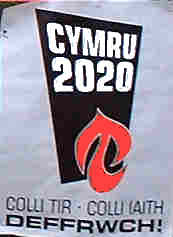 In their evidence to the Richard Committee [ written / oral ] they quoted replies from private companies to queries on their language policy: Tesco - "We do not have a specific Welsh language policy although we recently won awards for our delicatessen"; Iceland - " The lack of Welsh signs in our store is so as not to confuse customers"; Marks & Spencer - "The past two years have been difficult for the company"; Orange - "It is standard practice for us to conduct all business dealings and correspondence in English, in common with all English-based corporations and companies"; Vodaphone - "We are not going to do anything through the medium of Welsh unless compelled to by legislation".
In their evidence to the Richard Committee [ written / oral ] they quoted replies from private companies to queries on their language policy: Tesco - "We do not have a specific Welsh language policy although we recently won awards for our delicatessen"; Iceland - " The lack of Welsh signs in our store is so as not to confuse customers"; Marks & Spencer - "The past two years have been difficult for the company"; Orange - "It is standard practice for us to conduct all business dealings and correspondence in English, in common with all English-based corporations and companies"; Vodaphone - "We are not going to do anything through the medium of Welsh unless compelled to by legislation". The Society maintains that, under the 1993 act, the Assembly can define any body (public or private) providing a service to the public as a public body for the purposes of the act. However, there appears to be conflicting legal advice in this area and this has led the Society to call for a new act so that the Assembly will be able to enforce its own declared policy "to make it possible for everyone in Wales to live their life through their choice of language" (Iaith Pawb - Assembly policy statement).
Stay tuned to this Bat Channel.
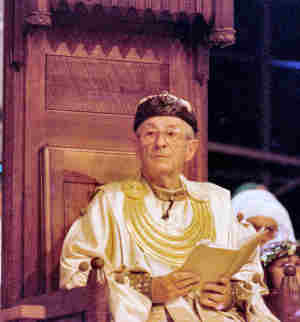 The current Archdruid, Selwyn Griffith [Selwyn Iolen], looked like being non-controversial when he was chosen last year, particularly compared to his ever-controversial predecessor, Robyn Lewis.
The current Archdruid, Selwyn Griffith [Selwyn Iolen], looked like being non-controversial when he was chosen last year, particularly compared to his ever-controversial predecessor, Robyn Lewis. He was on record as saying " I feel the role of the Archdruid is not important compared to the joy of seeing individuals being honoured ... I won't make statements to grab the headlines the next morning unless I feel it is just and right" .
He has now created a major stir by insisting that any interviews he gives on the field will be in Welsh only; non-Welsh-speaking interviewers are welcome to use an interpreter.
Eisteddfod officials have taken the view, against a background of mutterings about "inclusiveness", that this is a personal matter for the Archdruid.
He seems already to have made a mistake in politely explaining his stance, in English, to a reporter, who subsequently made great play of the fact that this explanation had been offered on the field. You really can't win with some people.
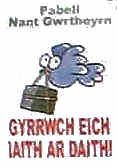 To give the Eisteddfod their due, they have gone a long way to facilitate non-Welsh speakers over the years. They have long provided free "walkman-type" radios which carry an English language commentary/translation of the activities on the main Pavillion stage, and in recent times the field is crawling with hosts/helpers who guide non-Welsh-speakers around the maes and interpret for them. In addition, while the people manning the stands are expected to give precedence to doing business in Welsh, there is no problem dealing with them wholly in English. The official programme now carries short summary timetables in English of the activities at various venues and shortened English versions of some of the other content.
To give the Eisteddfod their due, they have gone a long way to facilitate non-Welsh speakers over the years. They have long provided free "walkman-type" radios which carry an English language commentary/translation of the activities on the main Pavillion stage, and in recent times the field is crawling with hosts/helpers who guide non-Welsh-speakers around the maes and interpret for them. In addition, while the people manning the stands are expected to give precedence to doing business in Welsh, there is no problem dealing with them wholly in English. The official programme now carries short summary timetables in English of the activities at various venues and shortened English versions of some of the other content.
- signage
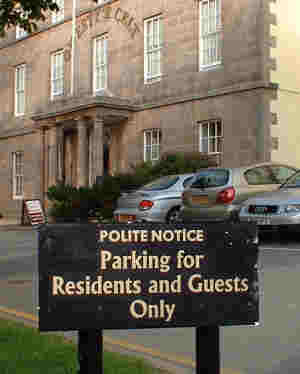 The Celtic Royal Hotel in Caernarfon has adopted an interesting approach to its name. In earlier days it was simply the Royal Hotel but fell into some disuse until it was refurbished in recent times and opened under the English title of "Celtic Royal Hotel" but in Welsh, simply, "Gwesty'r Celt" with not a royal to be seen or heard.
The Celtic Royal Hotel in Caernarfon has adopted an interesting approach to its name. In earlier days it was simply the Royal Hotel but fell into some disuse until it was refurbished in recent times and opened under the English title of "Celtic Royal Hotel" but in Welsh, simply, "Gwesty'r Celt" with not a royal to be seen or heard. They also had an interesting angle on politeness.
 "Polite" notices abounded in the outside front area. You wouldn't have to be Dutch to see them as "Police" notices at a quick glance!
"Polite" notices abounded in the outside front area. You wouldn't have to be Dutch to see them as "Police" notices at a quick glance!
One of the things you notice in Wales, at least in the Welsh-speaking areas, is that functional notices, ie those with warnings or instructions, tend to be bilingual even on private property. The implication is that the Welsh version is every bit as important as the English one and is the one read by a significant proportion of the population.

This is in contrast to the case in Ireland where bilingual signs are invariably mainly in public buildings and even then the Irish language version is more ornamental than functional.
Access
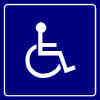 The Eisteddfod provides extensive free parking, along with special car parks for the disabled, which are either immediately beside the main entrance or are serviced by shuttle bus. However, the near car park filled up very early in the day and the shuttle service was reduced to a single bus in the middle of the bad weather; this made life extremely difficult for those with any significant handicap. This year also saw the introduction of electric scooters which could be hired for free for the day by those unable to walk the extensive site. However, the bad weather meant that these were of very limited use when attempting to visit stands which were surrounded by a sea of mud, as a large proportion of the stands were. Not unusually for an Eisteddfod, all the wellingtons in the area (in this case Caernarfon and Bangor) were sold out by the first day (Saturday). One shoe shop in Caernarfon had sold sixty pairs on the previous day.
The Eisteddfod provides extensive free parking, along with special car parks for the disabled, which are either immediately beside the main entrance or are serviced by shuttle bus. However, the near car park filled up very early in the day and the shuttle service was reduced to a single bus in the middle of the bad weather; this made life extremely difficult for those with any significant handicap. This year also saw the introduction of electric scooters which could be hired for free for the day by those unable to walk the extensive site. However, the bad weather meant that these were of very limited use when attempting to visit stands which were surrounded by a sea of mud, as a large proportion of the stands were. Not unusually for an Eisteddfod, all the wellingtons in the area (in this case Caernarfon and Bangor) were sold out by the first day (Saturday). One shoe shop in Caernarfon had sold sixty pairs on the previous day.
Royal versus Not

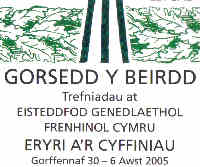
The Eisteddfod itself has long dumped the term "royal" from its title, not unconnected, I suspect, to the likelihood of Welsh Language Society protests and daubings had it not done so. The Gorsedd still retains the title in its literature but it does not appear on any signs. The Gorsedd is in the difficult position that Queen Elisabeth II is a member of green order of bards.
The term "royal" occurs in the titles of only four of the 400+ stands and halls on the Eisteddfod field: (i) Cyngor Tre Frenhinol Caernarfon; (ii) Clwb Rotari Tre Frenhinol Caernarfon; (iii) Coleg Brenhinol Cerdd a Drama Cymru; (iv) Comisiwn Brenhinol Henebion Cymru.
The first two refer to "Royal Caernarfon Town" which is even embedded in the official name of the Town Concil, the third is the Royal Welsh College for Art and Drama, and the last is the Royal Commission on the Ancient and Historical Monuments of Wales. Incidentally the Commission's stand on the field carries the Welsh title only.
Crown
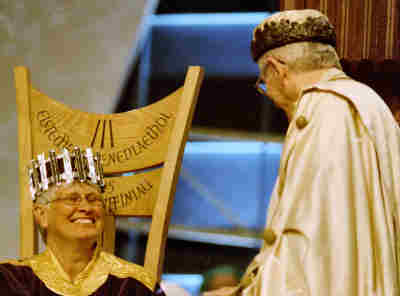 This year's crown was won by Christine James, who was raised in an English speaking family in the Rhondda Valley, but who went on to learn Welsh and graduated with a first class honours degree in Welsh from the University of Wales, Aberystwyth. She took to writing poetry to get herself through a serious illness and describes the process as a catharsis.
This year's crown was won by Christine James, who was raised in an English speaking family in the Rhondda Valley, but who went on to learn Welsh and graduated with a first class honours degree in Welsh from the University of Wales, Aberystwyth. She took to writing poetry to get herself through a serious illness and describes the process as a catharsis. She is currently a lecturer in the Welsh department of Swansea University.
Since 2000 she has co-edited the principal Welsh literary magazine "Taliesin" and she came close to winning the crown last year.
This victory by a non native Welsh speaker is very heartening for all of those currently acquiring Welsh as a second language.
Dynasties
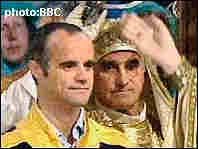 This year's chair was won for the second time by Tudur Dylan Jones, just ten years after he won his first chair at the Colwyn Eisteddfod in 1995. He claims he was motivated by his two daughters who both had eyes for his Bardic chair, so he figured he had better get another one to avoid disputes.
This year's chair was won for the second time by Tudur Dylan Jones, just ten years after he won his first chair at the Colwyn Eisteddfod in 1995. He claims he was motivated by his two daughters who both had eyes for his Bardic chair, so he figured he had better get another one to avoid disputes. Tudur was presented with his first chair by his father, who was then Archdruid, and this year his father was also on stage beside him when he was presented with the second chair. His father has now taken over as Gorsedd recorder from Jams Nicholas who has finally retired and whom I mentioned in earlier reports.
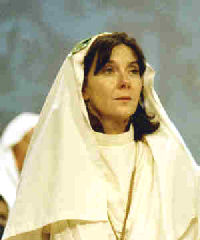 Tudur's poem, in strict cynhannedd metre, dealt with the passing on of history to the next generation.
Tudur's poem, in strict cynhannedd metre, dealt with the passing on of history to the next generation.Perhaps his daughters will carry on the tradition and take the chair at a future Eisteddfod, now that Mererid Hopwood, who won the chair in Denbigh, a woman's first, has shown the way.
Mererid herself may be getting into the dynasty business as her daughter Hanna won the storytelling competition this year. As reported previously Mererid won the chair at the Denbigh Eisteddfod and went on to win the crown two years later, not both at the same Eisteddfod, as erroneously reported during this year's Eisteddfod by that pillar of Welsh culture, the Western Mail. [2]
Variety
 In addition to the "normal" range of competitions and activities that one would expect, poetry, prose, music, and dance, the Eisteddfod caters for a wider range of contemporary themes. You can: attend a scripting workshop; learn to build a website (and enter the website competition another year); take part in dancing (line, disco, ballroom) or aerobics; join in the debate on Europe; attend peformances by artists and discuss their work with them; and see a (children's) pageant of the history of the area of an evening in the main pavillion (which by all accounts was excellent).
In addition to the "normal" range of competitions and activities that one would expect, poetry, prose, music, and dance, the Eisteddfod caters for a wider range of contemporary themes. You can: attend a scripting workshop; learn to build a website (and enter the website competition another year); take part in dancing (line, disco, ballroom) or aerobics; join in the debate on Europe; attend peformances by artists and discuss their work with them; and see a (children's) pageant of the history of the area of an evening in the main pavillion (which by all accounts was excellent).
Media
- General coverage
I reported on media coverage of the Eisteddfod in 2001 and little has changed since then. The Daily Post and the Western Mail carry sections on the Eisteddfod during the week. These tend to tabloid reporting as the Eisteddfod, as such, is probably a minority interest among readership of both papers. Clive Betts has left the Mail and with him a long corporate memory which reached back to his editorship of The Welsh Nation in the seventies. I see he is listed as one of Ned Thomas's backers for the new daily, so we may see him back in daily harness again, albeit mewn Cymraeg.
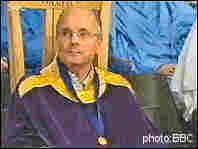 Some elements of the press are very much in tune with the Eisteddfod and the Gorsedd.
Some elements of the press are very much in tune with the Eisteddfod and the Gorsedd.This year's Prose Medal was won by Dylan Iorwerth, an habitu� of the press tent and editor of the "intellectual" Welsh language weekly "Golwg". Dylan, who has a background in print media, radio and television, had already won the crown at the Llanelli Eisteddfod in 2000.
Arwyn Roberts has been a photographer with the Herald for thirty years and has photographed Eisteddfodau, north and south, for twenty six of these. He was invited this year to join the green order of bards for his contribution to Welsh culture over the years.
- Welsh language daily
 When reporting on the 2002 Eisteddfod I mentioned that Ned Thomas was thinking of founding a daily Welsh language newspaper and was then researching its viability. Well, he's almost there, but not quite.
When reporting on the 2002 Eisteddfod I mentioned that Ned Thomas was thinking of founding a daily Welsh language newspaper and was then researching its viability. Well, he's almost there, but not quite. Latest story is that he expects to publish in the next six to nine months. The paper will be called "Y Byd" (The World) and it will come out five days a week, leaving the weekend to "Golwg" the existing intellectual Welsh language weekly referred to above.
Ned has spent the last few years raising funds for the launch. He now has about �250,000 out of a required �300,000 and a prestigious list of backers. He has a hard job ahead of him, though. Wales tends to be very local and he will have to include a wide range of material.
The existing English language papers, the Western Mail in the South and the [Liverpool] Daily Post in the North, carry minimal Welsh language material and tend towards tabloid reporting of affairs specifically relating to the Welsh language community, if and when they get around to it at all.
The Welsh language weekly, Y Cymro, had gone downhill since I first came across it in the seventies, but I am told it has perked up a little recently, whether in response to the threat of competition or not is not quite clear.
Na Gaeil
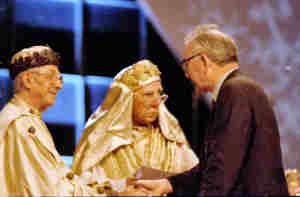
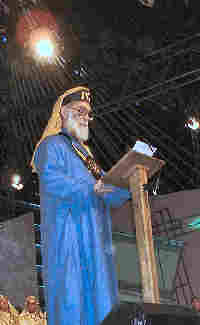
Delegates from the Oireachtas, Nollaig � Gadhra and Se�n � Drisceoil, received a warm welcome onstage from the Gorsedd.
They were joined by delegates from Brittany, Cornwall and the Patagonian Gorsedd.
The ceremony has been shortened since Denbigh and, instead of each delegation replying to the welcome in their own Celtic language, one delegate now replies for all, and this year it was the turn of the Cornish delegate.
While on the subject of the Irish, I noticed a piece in the local paper on the work of a local group to preserve St. Cybi's church on Anglesea. Although the site dates back 1,500 years to its foundation by St. Cybi in 450 AD, the current walls date back to the fifteenth century at most. This is put down to the damage caused by an Anglo-Irish attack in 1405, when, among other things, the shrine of St. Cybi was removed to Christchurch in Dublin.
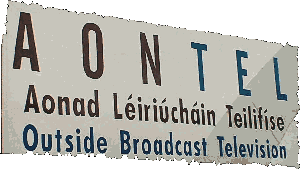
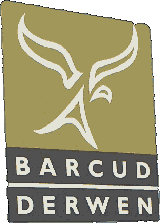 Aontel is a joint venture between Telegael, based in Spiddal, and Barchud Derwen, based in Cardiff.
Aontel is a joint venture between Telegael, based in Spiddal, and Barchud Derwen, based in Cardiff. Aontel has a �1.2 million outside broadcast unit and, apart from covering the Eisteddfod, has recorded U2's video for their No. 1 single "Beautiful Day".
Technology
The Eisteddfod's own website, while welcome, still needs a lot done with it. It has improved in certain respects since Denbigh. It is possible to access a live webcam from the pavillion stage, a number of reports, some of the adjudications and a certain amount of basic information. However, given the extent to which the media, not to mention the public, rely on web postings, it would be worth the Eisteddfod's while to run a virtual press room online, accessible to all.
While press releases are prepared, they do not all appear on the website. The [partial] database of results is only available well after the event. At present the site is carrying last year's results. This year the site gives a certain amount of information on the winner of the crown but nothing on the chair winner. and so on.
This is a pity as the potential of the site is enormous both for supplementing the knowledge of those actually in attendance and involving those who could not make it this year. I suspect the problem here is again one of resources. As I said on a previous occasion, a fulltime webmaster would be required for the week at least to exploit the site to the full.
That having been said, there is coverage available, and this is where the BBC does its usual brilliant job in both text and pictures, as well as carrying most of the events in the Pavillion on its Welsh language radio channel. S4C also brings a lot of the live action in the Pavillion to your screen during the day.
 One of the Eisteddfod's sponsors this year is GAIA technologies. The company provided a wireless access point on the field for sponsors, press and the public at large.
One of the Eisteddfod's sponsors this year is GAIA technologies. The company provided a wireless access point on the field for sponsors, press and the public at large. They were a bit surprised when virtually none of the press corps took up the offer of a free wireless connection. This may have been due, in part, to the Eisteddfod having also installed landlines which seemed to be used by almost all the reporters. Presumably they simply dialled in to their ISP without having even to change their usual settings.
I don't know if the public at large made much use of the service, but at �5 sterling an hour, or �25 for a continuous 24 hour period, I would be very surprised if they did. The Dylan Thomas Internet Caf� in Caernarfon was charging �3 an hour.
Board Games
There seems to be an increase generally in the use of board games for educational purposes. This is a bit ironic when the youth are graduating to playstations, but nevertheless there seem to be enough hardcopy fans around. My attention was recently drawn to what seems an inappropriate board game, based on Monopoly, which is marketed by a Roman Catholic repository and aimed at teaching the fundamentals of the Catholic religion (including building cathedrals!). More on this here.
 The Welsh National Assembly has produced a board game designed to educate the young in the arcane procedures of the chamber, complete with rules, counters representing the various parties (and independents) in the chamber and a great big red dice in a transparent ball which may not be quite the connotations that were originally intended.
The Welsh National Assembly has produced a board game designed to educate the young in the arcane procedures of the chamber, complete with rules, counters representing the various parties (and independents) in the chamber and a great big red dice in a transparent ball which may not be quite the connotations that were originally intended.This year also saw the first Welsh version of scrabble. It was stated on the radio that one could have always played scrabble in Welsh using the English version - a total load of rubbish. Anyway, the Welsh version is adapted to letter frequency in Welsh and includes the unique Welsh letters "ch", "dd", "ff", "ll", "rh" and presumably has "y" and "w" (a vowel) in the most frequent category. (The Guinness Book of Records was forced to recognise this difference in the 1970s.) "Pob lwc" as they say over there.
The Assembly stand was also running a competition to complete a Limerick, in either the Welsh or English language version. The Welsh version was hardly "cynghanedd" and the English version didn't scan, but some of the entries will be up on the Assembly website at some stage, so you can judge for yourself.
Thanks
to Betsan, Dyfed, and Peter in the Eisteddfod and
 Tom
in GAIA.
Tom
in GAIA.
Trimmings from Caernarfon

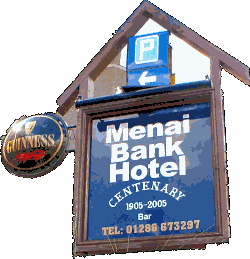
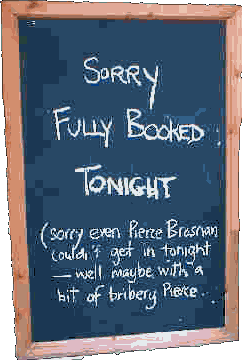



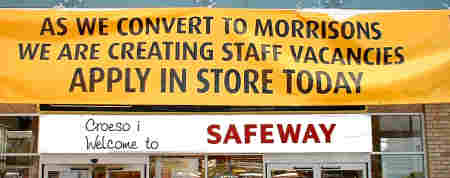
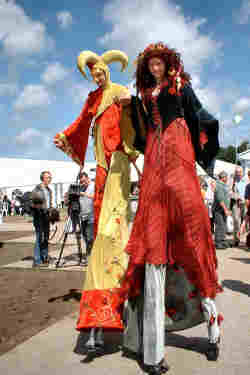
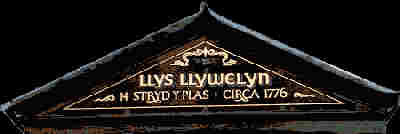
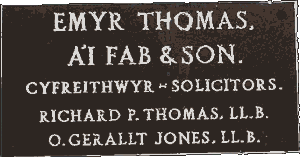
Footnotes
[1] You can see a (pdf) map of the field and the 400+ stands here . The annual report (English) and accounts (welsh only) for 2004 are available online.[2] Mererid has now written a book, in English explaining cynghannedd and it is available from amazon .